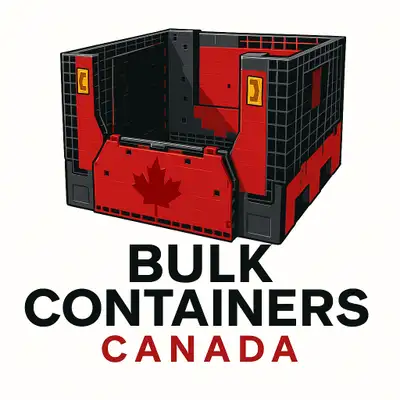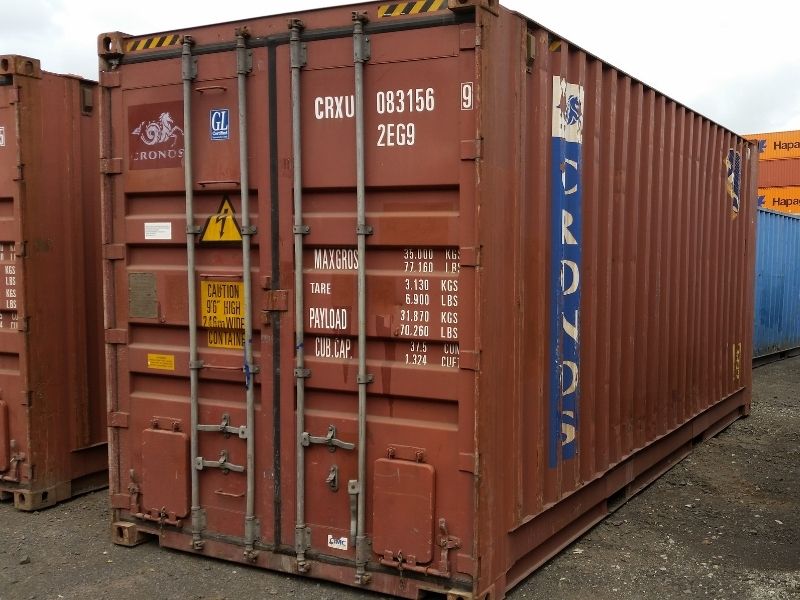Used collapsible containers as eco-friendly options for smart storage systems
Wiki Article
The Ultimate Overview to Selecting the Right Mass Containers for Your Company Requirements
Picking the appropriate bulk containers is crucial for any kind of service that depends on efficient logistics. Different sorts of containers exist, each created for certain materials and applications. Aspects such as size, material compatibility, and governing criteria play a considerable function in this decision-making procedure. Comprehending these components can cause boosted functional effectiveness. Nonetheless, lots of companies ignore vital elements that might boost their total effectiveness and sustainability. What are these considerations?Comprehending Different Sorts Of Mass Containers
Bulk containers work as vital tools for organizations seeking reliable storage space and transport solutions. These containers are available in different kinds, each created to satisfy specific operational requirements. One typical type is the intermediate bulk container (IBC), which is optimal for granulated and liquid products, using an equilibrium of ability and maneuverability. One more prominent option is the bulk bag, or FIBC, ideal for dry, flowable items. These versatile containers are light-weight and can be conveniently transferred and saved. For heavier materials, stiff mass containers are typically employed, offering sturdiness and security for safe handling. Furthermore, there are specific containers customized for unsafe materials, guaranteeing compliance with security policies. Understanding the distinctive characteristics of these mass container kinds enables organizations to make enlightened choices that enhance logistics and lower prices. By picking the appropriate container, companies can improve their functional performance and enhance their supply chain procedures.Key Product Factors To Consider for Mass Containers
When selecting bulk containers, it is necessary to consider the products utilized in their building and construction. Elements such as strength, toughness, and chemical compatibility play a vital role in guaranteeing the containers meet particular operational needs. Additionally, weight and transportability worries can affect both performance and transportation logistics.Material Toughness and Strength
Longevity and stamina are critical consider selecting products for bulk containers, as they directly affect the container's capacity to hold up against different ecological conditions and managing procedures. Materials such as high-density polyethylene (HDPE), polypropylene, and stainless steel are typically preferred for their durable residential or commercial properties, supplying resistance to abrasion, influence, and temperature level changes. The selection of material likewise influences the overall lifespan of the container; stronger materials normally result in much less regular substitutes, causing set you back savings gradually. In addition, the weight of the material can affect shipping costs and ease of handling. Services have to consider their particular operational environments and the potential for wear and tear to ensure peak resilience and toughness in their bulk container option.Chemical Compatibility Variables
Recognizing chemical compatibility is essential for picking mass containers, as the materials utilized must resist the certain materials they will certainly hold. Numerous aspects influence compatibility, including the chemical nature of the materials, temperature, and duration of storage space. For instance, destructive chemicals may need containers made from stainless steel or specialized plastics that stand up to destruction. Additionally, reactive compounds can generate warmth or gases, necessitating vented or pressure-rated containers. The selection of container material, whether polycarbonate, metal, or polyethylene, must align with the chemical residential properties of the saved substances to avoid leaks or breaches. Inevitably, an extensive examination of these compatibility variables assures safe handling and storage space, securing both personnel and the setting while preserving item honesty.Weight and Portability Issues
Selecting mass containers involves not just examining chemical compatibility however likewise thinking about weight and mobility. Services should examine the ease of handling and transportation to maximize performance. Light-weight products like high-density polyethylene (HDPE) or light weight aluminum can facilitate simpler movement and lower delivery prices. On the other hand, heavier containers may provide improved durability however can hinder wheelchair, especially in environments needing constant relocation. In addition, the design of the container ought to permit hassle-free lifting and stacking, making certain ergonomic safety for workers. Firms should additionally think about the facilities offered for transport; for instance, containers suitable with forklifts or pallet jacks can improve operations. Inevitably, the right balance between weight and portability directly affects functional performance and expense effectiveness.Sizing Your Mass Containers for Ideal Efficiency
When sizing mass containers, businesses should very carefully assess the measurements required to fit their particular products. In addition, weight ability is a critical element that affects performance and security throughout transportation and storage. Reliable sizing not only makes the most of space but likewise optimizes functional operations.Figuring Out Container Capacities
Picking the best measurements for bulk containers is important for optimizing performance in storage space and transportation. Organizations should analyze their details needs, taking into account aspects such as offered room, the nature of the products being kept, and the approaches of transportation made use of. visit this website Exact dimensions guarantee that containers fit preferably in cars and warehouses, minimizing thrown away room and reducing managing time. Standard dimensions can provide benefit, but personalized measurements may be essential for distinct needs or to accommodate specific items. Furthermore, it is necessary to evaluate stacking capacities and ease of access, as these aspects affect general operational efficiency. Ultimately, the ideal measurements result in enhanced company and structured logistics, profiting the overall efficiency of the organization.Weight Ability Considerations
Comprehending weight ability is important for companies aiming to maximize their bulk container performance. The weight capability of a container directly influences storage abilities, transport logistics, and overall functional costs. Selecting containers with the ideal weight limits guarantees that organizations can securely keep and move their products without running the risk of damage or compliance problems. Straining containers can lead to structural failures, while underutilizing capacity cause squandered resources. It is very important for organizations to assess their product weights and consider any kind of governing needs when selecting containers. Additionally, elements such as the type of product, planned usage, and environmental conditions ought to likewise affect weight capacity decisions. By assessing these elements, businesses can boost effectiveness and guarantee a streamlined supply chain.Governing Compliance and Safety And Security Specifications

Regulatory compliance and safety and security requirements play an important role in the option of bulk containers for companies. Organizations must ensure that their containers fulfill various laws set by regional, nationwide, and global authorities. These standards commonly refer to material security, architectural integrity, and appropriate labeling, which assist protect against accidents and guarantee the safe transport of items.
Furthermore, adherence to industry-specific guidelines, such as those from the Fda (FDA) or the Occupational Security and Wellness Management (OSHA), is important for firms dealing with unsafe products or food. Non-compliance can result in fines, legal issues, or damage to a service's reputation.
Services need to also consider the container's compatibility with the materials being stored or this website moved to prevent contamination or chain reaction (refurbished bulk containers). To summarize, understanding and carrying out regulative compliance and safety standards is vital for the efficient and accountable use of mass containers
Sustainability Options for Eco-Friendly Mass Containers

Companies are additionally exploring options made from recycled materials, which not just preserve sources however additionally sustain the recycling industry. Furthermore, technologies in layout enable lighter containers that call for less energy to transportation, additionally enhancing sustainability. By incorporating these eco-friendly bulk container alternatives, organizations can show their dedication to ecological stewardship while meeting customer need for sustainable practices. This shift not only aids the earth but can additionally boost brand credibility and customer commitment.
Cost-Effectiveness and Budgeting for Bulk Containers
While numerous organizations concentrate on sustainability, cost-effectiveness stays a vital factor when choosing mass containers. Organizations must analyze the first acquisition price, as well as lasting operational prices, to assure financial viability. Elements such as upkeep, resilience, and reusability play a significant function in determining general costs.Purchasing high-grade containers may produce higher in advance costs however can lead to savings with lowered replacement prices and reduced waste. In addition, services need to think about transport expenses and storage space efficiency, as these can affect the overall budget.

Regularly Asked Inquiries
How Do I Establish the Right Container for Hazardous Materials?
To figure out the ideal container for harmful products, one have to evaluate compatibility with the compound, consider the container's material, look for governing compliance, and analyze capacity and security attributes to assure correct handling and storage space.Can Mass Containers Be Customized for Details Products?
Yes, bulk containers can be tailored for details items. used bulk containers. Numerous features, such as material, size, and design, can be customized to fulfill distinct needs, guaranteeing excellent safety and efficiency for transferring and storing different productsWhat Is the Average Lifespan of Various Bulk Container Kind?
The average lifespan of mass container types varies; plastic containers last 5-10 years, steel containers 10-20 years, and wood containers usually last 3-7 years, depending on usage, maintenance, and ecological conditions.Just how Should I Clean and Maintain Mass Containers?
To clean up and maintain bulk containers, one need to routinely evaluate for damage, get rid of deposit, laundry with appropriate detergents, rinse extensively, and guarantee correct drying before storage. Following maker standards improves longevity and security during use.Exist Rental Alternatives for Bulk Containers Available?
Yes, countless firms offer rental alternatives for bulk containers, supplying adaptability for businesses. These services can fit numerous requirements, allowing firms to take care of stock efficiently without the dedication of acquiring containers outright.Durability and toughness are essential aspects in selecting materials for mass containers, as they directly affect the container's capacity to endure different environmental problems and dealing with procedures. Understanding chemical compatibility is crucial for choosing bulk containers, as the products used need to resist the certain materials they will hold. Recognizing weight capability is crucial for companies intending to enhance their bulk container effectiveness. Governing conformity and safety and security requirements play an essential duty in the choice of bulk containers for organizations. While many companies focus he has a good point on sustainability, cost-effectiveness remains an essential aspect when picking bulk containers.
Report this wiki page